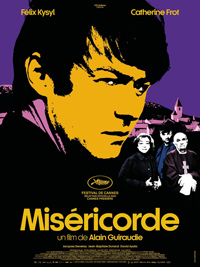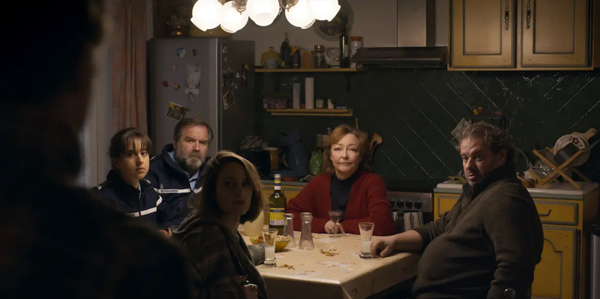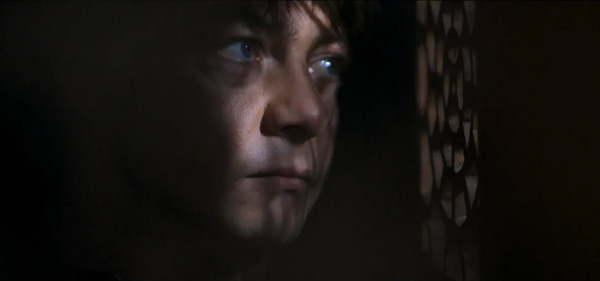Kiss Me or Kill Me: Guiraudie Stirs a Sinister Solace in the Backwoods
 Alain Guiraudie returns to the ruinous climes of rural malcontentedness with his latest, Miséricorde, which means ‘mercy.’ Of course, the meaning of mercy takes on ironic dimensions as this narrative unfolds about a potential interloper returning to the place of his youth, where masculinity and sexuality play a significant role in his fate. Like his 2013 masterpiece Stranger by the Lake (read review) and 2016’s Staying Vertical (read review), Guiraudie remains keenly interested in exploring the sometimes detrimental effects an isolated, bucolic environment can have on the gay male experience, where violence and dread are inextricable elements in the pursuit of pleasure—physical or otherwise. His latest is no exception, and a shocking turn of events leads the narrative into pure noir territory.
Alain Guiraudie returns to the ruinous climes of rural malcontentedness with his latest, Miséricorde, which means ‘mercy.’ Of course, the meaning of mercy takes on ironic dimensions as this narrative unfolds about a potential interloper returning to the place of his youth, where masculinity and sexuality play a significant role in his fate. Like his 2013 masterpiece Stranger by the Lake (read review) and 2016’s Staying Vertical (read review), Guiraudie remains keenly interested in exploring the sometimes detrimental effects an isolated, bucolic environment can have on the gay male experience, where violence and dread are inextricable elements in the pursuit of pleasure—physical or otherwise. His latest is no exception, and a shocking turn of events leads the narrative into pure noir territory.
Jeremie (Félix Kysyl) returns to the quiet climes of Saint-Martial to attend the funeral of his old employer, Jean-Pierre. He used to work in the old man’s bakery, which was shuttered long ago. Greeted warmly by Jean-Pierre’s widow, Martine (Catherine Frot), he accepts her offer to stay and keep her company, as she doesn’t like being alone. Her son Vincent (Jean-Baptiste Durand), a laborer who used to be friendly with Jeremie when they were youths, is not pleased at this arrangement. Suspicious of Jeremie’s intentions with his mother, with whom he believes his old friend is romantically interested in, he’s not too pleased to see him stay. This feeling intensifies when Martine suggests Jeremie re-open the bakery. The two men begin to become physically aggressive towards one another, and between them is another old friend, Walter (David Ayala), whose presence seemed to spark jealousy between the men. When Jeremie gets drunk and makes a pass at Walter in his home, the rendezvous ends violently. Shortly after, Vincent picks Jeremie up on the side of the road, and tragedy changes the course of events drastically. Meanwhile, a local abbot (Jacques Develay) has his own secret desires regarding Jeremie, and sees an opportunity to help the young man while also satisfying his own needs.

Guiraudie often develops a somewhat circuitous, offbeat narrative in his films, and one learns to expect the unexpected, sometimes even unexplainable. His latest is a callback to his favored themes, obviously recalling Stranger by the Lake (not to mention his 2018 novel Now the Night Begins) with its ingredients of gay men, queer sex, and murder but also the often transactional natures, both emotional and physical, readily employed between these men. But with Miséricorde, the more pronounced narrative shift feels like a Jacques Nolot film slipping into Patricia Highsmith territory.
As Jeremie, Kysyl is an inscrutable drifter, clearly someone who doesn’t think too carefully about his future or the consequences of his actions. Claiming he hasn’t worked for the past three months, the offer to take over his old employer’s bakery actually seems like the life resolution he needs, and his actions suggest he’s not going to pass up the opportunity. The great Catherine Frot brings another odd element into Guiraudie’s mix, and by the time the end credits roll, we come to realize she’s also had her own agenda and needs to fulfill.

A pair of rural cops show up to investigate a disappearance who are about as savvy as the law enforcement Bruno Dumont seems to appreciate, which lends Miséricorde a droll sensibility. Ultimately, it’s a film about satisfying one’s needs in the face of untenable circumstances. The affable abbot explains, “I have learned to love without return.” But, as we all know, desires and needs don’t disappear, and strange occurrences happen when the paths to their fulfillment are interrupted.
Reviewed on May 20th at the 2024 Cannes Film Festival – Cannes Premiere section. 102 Mins
★★★½/☆☆☆☆☆


